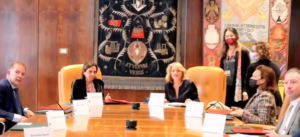Joining forces to research the Holocaust, a new agreement focuses on history and education
 Research activities on the Holocaust, with specific attention to Italy; the reconstruction of the professional biography of teachers expelled by racist laws; the start of researches on prisoners victims of medical trials in concentration camps and on the biographies of collaborationist Italian doctors; creation of popular and scientific publications; promotion of educational events; organization of exhibitions to promote the cultural heritage of the institutions involved as the results of their collaboration.
Research activities on the Holocaust, with specific attention to Italy; the reconstruction of the professional biography of teachers expelled by racist laws; the start of researches on prisoners victims of medical trials in concentration camps and on the biographies of collaborationist Italian doctors; creation of popular and scientific publications; promotion of educational events; organization of exhibitions to promote the cultural heritage of the institutions involved as the results of their collaboration.
These are some of the many areas in which a new framework agreement on Memory will operate, according to a document signed last week by La Sapienza University of Rome, the Union of Italian Jewish Communities, the National Museum of Italian Judaism and the Shoah, the Contemporary Jewish Documentation Center Foundation, the Shoah Museum Foundation, and the Jewish Community of Rome.
“Memory is a fundamental pillar for our university. Today we are celebrating a very important milestone”, remarked the Chancellor of La Sapienza Antonella Polimeni. For the university, the agreement is another step into a path that has been traced for some time, with dedicated educational courses and initiatives of a high symbolic value such as the honorary awards given in the past to the Holocaust survivors Sami Modiano and Liliana Segre. “Ours – in the words of Polimeni – is a commitment to knowledge, to resilience to all forms of racism, intolerance and discrimination”. A commitment that is very necessary in a complex period in which the pandemic proved to be “an absolute amplifier of inequalities”.
The agreement, according to UCEI President Noemi Di Segni, “hinges on the concept of responsibility for a coherent memory path to Memory for the largest university in Italy, recognized by the solemn adhesion of all the Jewish institutions present”. There are many challenges to be faced, even in contrast to “classic denialism” or attempts to de-legitimize Israel which also involve “stifling the voice of those who, with their academic commitment, dedicate themselves to the good of humanity”.
“Today we seal an ancient work made up of many resources and energies”, said the president of the Jewish Community of Rome Ruth Dureghello. A university, La Sapienza, characterized in this sense by strong values ” triggered in the conscience of our children”. A very different approach compared to a not-too-distant past in which racist laws, Dureghello recalled, “founded their consistency precisely in an academic context”.
As for Mario Venezia, president of the Shoah Museum Foundation, he stressed the need for “concrete facts and actions”, like those that have marked the ongoing collaboration and that are the basis of the Foundation’s mission itself. He also mentioned the involvement of “about 10 thousand students reached, during the pandemic, with online initiatives”.
“Great momentum” and “transport”: these are the sentiments with which the MEIS has chosen to join, according to director of the museum Rabbi Amedeo Spagnoletto. The work of education to Memory is essential, he remarked, also with reference to the reality of the museum. “Our challenge – he explained – is to be more and more a point of reference for schools, starting from the region of Emilia-Romagna “.
For Gadi Luzzatto Voghera, director of the CDEC Foundation, the goal must be to link the protocol “not only to the Shoah, but to include paths into the history of Judaism as an essential component of Italian civilization: the founding idea of the MEIS”. It is a necessary element, he stressed out, to strengthen a solid cultural base “that supports Memory and the fight against anti-Semitism”. Among those present, the chief rabbi of Rome, Riccardo Di Segni and UCEI councilor Livia Ottolenghi.
